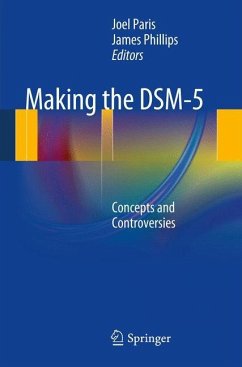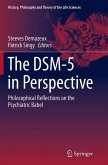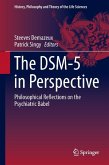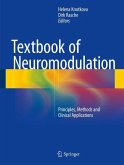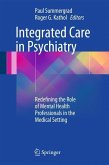In 2013, the American Psychiatric Association published the 5th edition of its Diagnostic and Statistical Manual of Mental Disorders (DSM-5). Often referred to as the "bible" of psychiatry, the manual only classifies mental disorders and does not explain them or guide their treatment. While science should be the basis of any diagnostic system, to date, there is no knowledge on whether most conditions listed in the manual are true diseases. Moreover, in DSM-5 the overall definition of mental disorder is weak, failing to distinguish psychopathology from normality. In spite of all the progress that has been made in neuroscience over the last few decades, the psychiatric community is no closer to understanding the etiology and pathogenesis of mental disorders than it was fifty years ago.
In Making the DSM-5, prominent experts delve into the debate about psychiatric nosology and examine the conceptual and pragmatic issues underlying the new manual. While retracing the historic controversy over DSM, considering the political context and economic impact of the manual, and focusing on what was revised or left unchanged in the new edition, this timely volume addresses the main concerns of the future of psychiatry and questions whether the DSM legacy can truly improve the specialty and advance its goals.
In Making the DSM-5, prominent experts delve into the debate about psychiatric nosology and examine the conceptual and pragmatic issues underlying the new manual. While retracing the historic controversy over DSM, considering the political context and economic impact of the manual, and focusing on what was revised or left unchanged in the new edition, this timely volume addresses the main concerns of the future of psychiatry and questions whether the DSM legacy can truly improve the specialty and advance its goals.
From the reviews:
"Making the DSM-5, is an edited book comprising 11 chapters, eight of which were written by individuals who listed medical school affiliations. ... is a consistently engaging and thought-provoking read. ... the authors address issues that the leaders of the DSM-5 process generally seemed to ignore. ... should be required reading of any task force members who attempt to create the DSM-6." (Roger Blashfield, PsycCRITIQUES, Vol. 59 (14), April, 2014)
"This book addresses the formation of the DSM-5 and the problems with the manual itself. ... The audience includes anyone interested in the field of mental health and the DSM-5 in particular. ... It will definitely open readers' eyes to how little we still know and how artificial our constructs are for understanding mental illness. It is a short book and I would highly recommend taking the time to read it." (Brett C. Plyler, Doody's Book Reviews, November, 2013)
"Making the DSM-5, is an edited book comprising 11 chapters, eight of which were written by individuals who listed medical school affiliations. ... is a consistently engaging and thought-provoking read. ... the authors address issues that the leaders of the DSM-5 process generally seemed to ignore. ... should be required reading of any task force members who attempt to create the DSM-6." (Roger Blashfield, PsycCRITIQUES, Vol. 59 (14), April, 2014)
"This book addresses the formation of the DSM-5 and the problems with the manual itself. ... The audience includes anyone interested in the field of mental health and the DSM-5 in particular. ... It will definitely open readers' eyes to how little we still know and how artificial our constructs are for understanding mental illness. It is a short book and I would highly recommend taking the time to read it." (Brett C. Plyler, Doody's Book Reviews, November, 2013)

